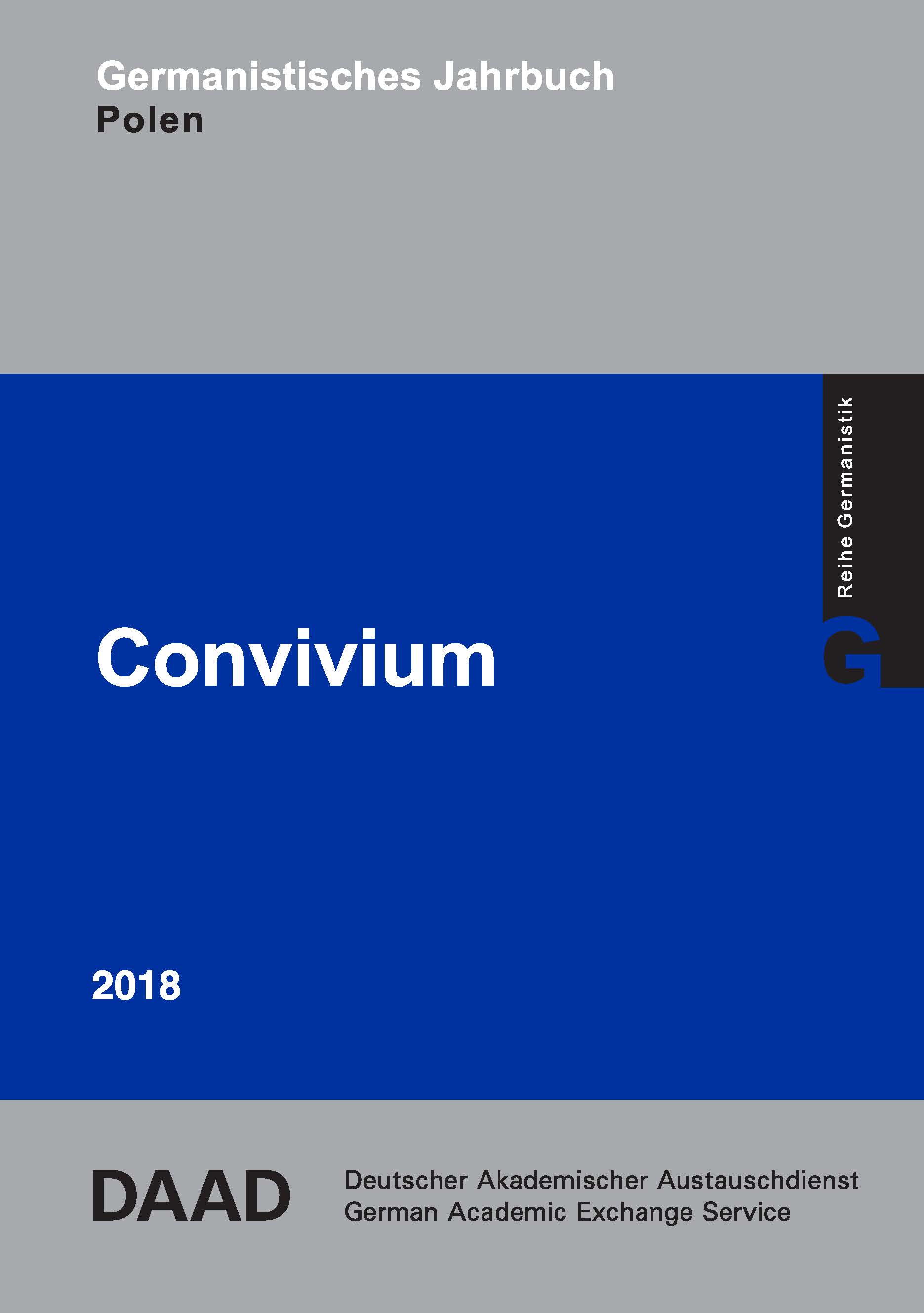Methods of word formation and structures in the process of nomination. A case study based on lexical units from the socio-political field of 1989
DOI:
https://doi.org/10.18778/2196-8403.2018.04Keywords:
methods of word formation, nomination, revolution 1989Abstract
The paper begins by defining the concept of nomination and then discusses the reasons and motives in the process of nomination. Based on corpus-driven examples from social and political news stories, the article presents an overview of methods of word formation as well as various types of lexical nomination units. The linguistic analysis focuses on word formation mechanisms, syntactic and semantic methods used in the process of nomination of objects.
References
BRINKER, KLAUS (62005): Linguistische Textanalyse. Eine Einführung in Grundbegriffe und Methoden. Berlin.
Google Scholar
BUSSE, DIETRICH (1992): Textinterpretation. Sprachtheoretische Grundlagen einer explikativen Semantik. Opladen.
Google Scholar
DOI: https://doi.org/10.1007/978-3-322-83944-2_4
FEINE, ANGELIKA (1997): Mit Spritfressern in die Klimakatastrophe? Betrachtungen zu Mehrfachbenennungen in publizistischen Texten. In: KESSLER, CHRISTINE / SOMMER-FELDT, KARL-ERNST (eds.): Sprachsystem – Text – Stil. Festschrift für Georg Michel und Günter Starke zum 70. Geburtstag. Frankfurt a. M., 61-73.
Google Scholar
FEINE, ANGELIKA (1999): Zur Benennungsmotivation beim Gebrauch von Nominationsvarianten. In: DÖRING, BRIGITTE / FEINE. ANGELIKA / SCHELLENBERG, WILHELM (eds.): Über Sprachhandeln im Spannungsfeld von Reflektieren und Benennen. Frankfurt a. M., 73-88.
Google Scholar
FEINE, ANGELIKA (2000): Benennungsausdrücke: Bildungsverfahren und Strukturen. In: FEINE,ANGELIKA / ŻYDEK-BEDNARCZUK, URSZULA (eds): Beiträge zur Nomination im Deutschen und Polnischen. Katowice, 9-24.
Google Scholar
FLEISCHER, WOLFGANG (1989): Nomination und unfeste nominative Ketten. In: FLEISCHER, WOLFGANG / GROSSE, RUDOLF / LERCHNER, GOTTHARD (eds.): Beiträge zur Erforschung der deutschen Sprache 9. Leipzig, 13-27.
Google Scholar
GŁADYSZ, MAREK (2006): Morphosyntaktische und onomasiologische Struktur von Nominationseinheiten. In: CIRKO, LESŁAW / GRIMBERG, MARTIN (eds.): Phänomene im syntaktisch-semantischen Grenzbereich. Materialien der internationalen Linguisten-konferenz Karpacz 27.-29.09.2004. Dresden / Wrocław, 103-116.
Google Scholar
GŁADYSZ, MAREK (2007): Kreativität und Sprachlust bei der Mehrfachbenennung. In: CIRKO, LESŁAW / GRIMBERG, MARTIN (eds.): Sprachlust – Norm – Kreativität. Materialien der internationalen Linguistenkonferenz Karpacz 12.-14.09.2005. Dresden / Wrocław, 83-93.
Google Scholar
GOŁĘBIOWSKI, ADAM / ENGEL, ULRICH (2014): Sachen charakterisieren. In: ENGEL, ULRICH / BŁACHUT, EDYTA / GOŁĘBIOWSKI, ADAM / JURASZ, ALINA (eds.): Über Sachen reden. Sprechen im deutsch-polnischen Kontrast. Hamburg, 67-95.
Google Scholar
GRICE, HERBERT PAUL (1957): Meaning. In: The Philosophical Review 66: 377-388. [Ins Deutsche übersetzt von GEORG MEGGLE als Intendieren, Meinen, Bedeuten. In: MEGGLE, GEORG (ed.) (1979): Handlung, Kommunikation, Bedeutung. Frankfurt a. M., 2-15.]
Google Scholar
GRICE, HERBERT PAUL (1969): Utterer’s Meaning and Intentions. In: The Philosophical Review 78:147-177. [Ins Deutsche übersetzt von GEORG MEGGLE als Sprecher-Bedeutung und Intentionen. In: MEGGLE, GEORG (ed.) (1979): Handlung, Kommunikation, Bedeutung. Frankfurt a. M., 16-51.]
Google Scholar
HELLMANN, MANFRED W. (2006): Wörter in Texten der Wendezeit. Ein Wörterbuch zum „Wendekorpus“ des IDS. Mai 1989 bis Ende 1990. Unter Mitwirkung von PANTELIS NIKITOPOULOS und CHRISTOPH MELK. CD-ROM mit Begleitband. Mannheim.
Google Scholar
HERBERG, DIETER / STEFFENS, DORIS / TELLENBACH, ELKE (1997): Schlüsselwörter der Wendezeit. Wörter-Buch zum öffentlichen Sprachgebrauch 1989/90. Berlin / New York (= Schriften des Instituts für Deutsche Sprache 6).
Google Scholar
DOI: https://doi.org/10.1515/9783110820850
KELLER, RUDI (1995): Zeichentheorie. Zu einer Theorie semiotischen Wissens. Tübingen / Basel.
Google Scholar
KNOBLOCH, CLEMENS (1996): Nomination: Anatomie eines Begriffs. In: KNOBLOCH, CLEMENS / SCHAEDER, BURKHARD (eds.): Nomination – fachsprachlich und gemein-sprachlich. Opladen, 21-54.
Google Scholar
DOI: https://doi.org/10.1007/978-3-322-83272-6_2
KNOBLOCH, CLEMENS / SCHAEDER, BURKHARD (1996): Nomination – fachsprachlich und gemeinsprachlich. Ein Vorwort. In: KNOBLOCH, CLEMENS / SCHAEDER, BURKHARD (eds.): Nomination – fachsprachlich und gemeinsprachlich. Opladen, 7-19.
Google Scholar
DOI: https://doi.org/10.1007/978-3-322-83272-6_1
LIEBERT, WOLF-ANDREAS (2003): Zu einem genetischen Konzept von Schlüsselwörtern. In: Zeitschrift für Angewandte Linguistik 38:57-75.
Google Scholar
LÜGER, HEINZ-HELMUT (1995): Pressesprache. Tübingen.
Google Scholar
DOI: https://doi.org/10.1515/9783110929522
POLENZ, PETER VON (1985): Deutsche Satzsemantik. Grundbegriffe des Zwischen-den-Zeilen-Lesens. Berlin / New York.
Google Scholar
DOI: https://doi.org/10.1515/9783110864366
POSNER, ROLAND (1992): Believing, causing, intending: The basis for a hierarchy of sign concepts in the reconstruction of communication. In: JORNA, RENÉ J. / VAN HEUSDEN, BAREND / POSNER, ROLAND (eds.): Sign, Search and Communication: Semiotic Aspects of Artificial Intelligence. Berlin / New York, 215-270.
Google Scholar
DOI: https://doi.org/10.1515/9783110871579.215
SCHIPPAN, THEA (1992): Lexikologie der deutschen Gegenwartssprache. Tübingen.
Google Scholar
WAGNER, KLAUS R. (2001): Pragmatik der deutschen Sprache. Frankfurt a. M.
Google Scholar
Downloads
Published
How to Cite
Issue
Section
License

This work is licensed under a Creative Commons Attribution-NonCommercial-NoDerivatives 4.0 International License.










